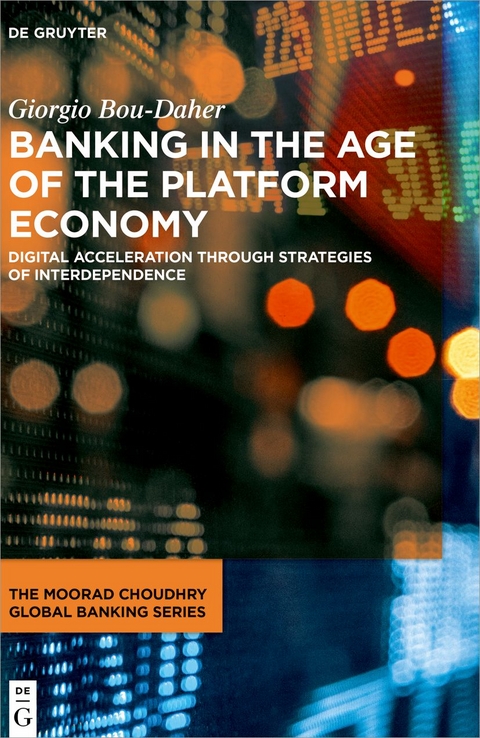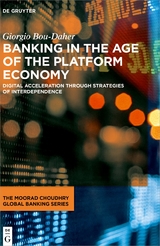Banking in the Age of the Platform Economy
De Gruyter (Verlag)
978-3-11-079239-3 (ISBN)
The 2008 global financial crisis and the concurrent rise of the platform economy have had profound effects on the banking sector. Over the past decade and a half, banking leaders have had to contend with rapidly evolving regulatory, technological, and competitive forces. The pace of technological change has been formidable with advances in artificial intelligence, cloud computing, and blockchain technology. These forces have brought to the forefront new managerial imperatives that banking leaders have to make sense of as they strategise in light of these unfolding new realities.
Banking in the Age of the Platform Economy explores the strategies that managers and leaders at banks and other financial institutions have adopted in response to the rise of the platform economy, the new forces of interdependence that it entails, and the risks/opportunities involved in cocreating value with external stakeholders.
With its discussion of the strategies of interdependence and value cocreation that the top twenty banks in Europe adopted between 2008 and 2019, this book is essential reading for academics, banking and fintech professionals, and management consultants that advise banks and fintechs.
lt;p> Giorgio Bou-Daher is the Sales Director for Tuum, a modular banking platform that allows banks and fintechs to rapidly offer tailored financial services to their customers. Prior to this role, Giorgio has worked at the intersection of banking and technology in various roles at Gartner, IBM, Thomson Reuters, and Bloomberg, where he advised banks, regulators, fintechs, and other financial services providers on their digital transformation strategies.
He holds an Executive PhD from Université Paris Dauphine (Paris Sciences et Lettres), an MSc in Technology Ventures and Entrepreneurship from University College London, and a BEng (Hons) in Civil Engineering from the University of Nottingham. His doctoral research focused on the different strategies that banks adopted in response to the evolving technological, regulatory, and competitive forces that characterise the platform economy. He has presented his research at various conferences, including at the European Academy of Management, the British Academy of Management, and the Association Internationale de Management Stratégique. Giorgio is a visiting lecturer at EM Normandie Business School and is a member of the Worshipful Company of International Bankers.
I recommend that every practitioner reads this book. It helps banking leaders to navigate the new strategic realities of the platform economy age, including new regulatory, competitive, and technological challenges . . . the book cuts through much of the hubris that has accompanied the fintech revolution, making clear distinctions between fintechs and banks, and demonstrating how the relationship between banks, bigtechs, and fintechs is a lot more nuanced and often involves complementarities. --Dr Marko Sjoblom, Founder of Fiinu Plc (BANK.LN), a public fintech group, including Fiinu Bank
Giorgio Bou-Daher's Banking in the Age of the Platform Economy is an exceptional book that studies how banks responded to the main forces of interdependence in a highly regulated banking sector and how they managed to reposition emerging competition by fintech and bigtech into new alliances through value cocreation. The book demonstrates how the forces of interdependence and technological and regulatory changes have pushed Tier 1 banks in the European market to rethink their strategies while presenting the opportunities and risks of value cocreation with external stakeholders. It delivers a holistic landscape of the paths followed by banks when a reinvention of the system was required to compete with new entrants in the market and to accompany the transition from a traditional banking system to the era of the platform economy. --Dr Nisrine El Mir, Director of Legal Europe at SITA, Lawyer specialised in the IT industry
Rooted in deep empirical study and a good knowledge of the academic literature, Giorgio Bou-Daher provides a useful guide to understand the recent (r)evolutions in the banking sector. By linking a reflection on regulation, new technologies and the strategic choices of the companies, the reader will understand the complex relationships and interdependence between incumbents, fintechs and deeptechs, as well as the new business models that have emerged recently. A must-read book for those interested in business model innovation and the banking sector. --Prof Benoît Demil, Professor of Strategy and Management at University of Lille
Banking in the Age of the Platform Economy is an essential read for anyone looking to stay ahead of the curve in a rapidly evolving financial landscape. Written by Giorgio Bou-Daher, an industry expert, this book offers a comprehensive overview of the banking sector's transformation and the implications for the future of the industry. From the development of new technologies to the opportunities and challenges posed by the rise of the platform economy, Banking in the Age of the Platform Economy is an invaluable source of insight and analysis for anyone interested in understanding the impact of this ground-breaking trend, and especially banking and fintech students. Highly recommended! --Dr Elian Pilvin, Dean and Director General of EM Normandie Business School
In this volume, Dr. Bou-Daher offers a comprehensive analysis and valuable insights on the current state of banking and the various forces shaping the industry, particularly in the context of networks in the platform economy age. The author provides a nuanced perspective on the impact of regulatory, structural, and technological changes on the traditional banking sector, carefully considering both the challenges and opportunities these forces present. The in-depth examination of the banking industry's strategic considerations in the platform economy age is valuable for anyone seeking to understand the role these technologies will play in the future of banking. Overall, this book is a valuable resource for anyone looking to gain a deeper understanding of the current state of the banking industry and the factors shaping its future development. --Dr Hala A. Guta, Associate Professor of Mass Communication, Qatar University
This is an essential textbook for practitioners and students alike, examining how top banks have navigated profound disruption since the Global Financial Crisis and the rise of the platform economy. Drawing on his rigorous empirical research, Giorgio Bou-Daher elegantly explores the extent to which European banks have responded to new competitive forces by mobilising their resources and capabilities to deploy digital acceleration strategies. This book's insights have crucial implications for banks and their stakeholders as the platform economy grows. --Tony McVeigh BA (Hons), PG Dip (Oxon), MA, ACSI, Banker & Senior Director, City of London
Banking in the Age of the Platform Economy is a reference book on the evolution of the banking sector post-2008 Global Financial Crisis, and its strategies of digital acceleration. It provides a deep dive into the adaptations of the top 20 European banks to regulatory changes and the rise of the platform economy. Giorgio Bou-Daher has developed a taxonomy showing their different strategies and approaches regarding value cocreation with external parties such as fintechs and bigtechs. This book also relies on a deep and comprehensive set of empirical data. It should be read by all banking and fintech leaders. --Hervé Rubiella, Founding Partner at Fx Care, former Global Head of Financial Institutions and Public Sector Coverage at Natixis
Banking in the Age of the Platform Economy . . . is indeed a breath-taking journey into the moving world of the banking industry. Giorgio Bou-Daher is offering his readers a very balanced and deeply documented view of the challenges at stake. Are we attending a Darwinian war between "traditional banks" and new players such as fintechs, where, through competition, some will die and some others will dominate? . . . He is opening many doors to plausible futures, with the wisdom of a writer who is both reading tomorrow as different from yesterday and as a continuum from a long past. --Guillaume Lefebvre, Executive for the Crédit Agricole Group, CEO of IFCAM, the Group's Corporate University
Bou-Daher's analysis is captivating, and his perspective marks a welcoming contribution . . . from the vantage point of both a practitioner - having worked for nearly two decades at the intersection of technology and banking - and now, in parallel, as a scholar. This is an erudite and expansive contribution which will be of value to students and academics, as well as financial services and banking practitioners alike. --Dr Mathew Todres, Lecturer in Management, Faculty of Business and Law, University of Wollongong, Australia
This book will provide you with an analytical framework and a longitudinal study of the strategic responses of the largest twenty European banks over the period 2008-2019 . . . a book that will interest the many leaders facing the digital transformation of their industry, far beyond only the banking industry. --Dr Henri Isaac, Associate Professor at Paris Dauphine University, PSL and former President of Renaissance Numérique (2016-2021)
A useful book to comprehend and master some of the new challenges and opportunities of Open Banking and digitalisation of financial services. --Dr Daniele D'Alvia, Lecturer in Banking and Finance Law at CCLS Queen Mary University of London
Giorgio provides incredible vision into the past, present and future of banking. His analysis and foresight is articulated beautifully, providing an invaluable resource for those reviewing or redefining their strategy. --Adrian Hall, Research Board Program Director at Gartner, former Head of Strategy in Global Technology Infrastructure and Services at Barclays
Bou-Daher uses rigorous research and his industry experience to dispel concerns about the banking industry's potentially "troubled" future. Bou-Daher puts forward a well-reasoned and compelling case on how banks have unique strengths that are basically impossible for any tech company, no matter how innovative or large, to replicate; a fact that puts banks a) in a much less vulnerable position than previously thought, and b) opens the door to a future - not of defensive retrenchment against tech companies - but of cooperation and joint innovation with these new market entrants. --Salvador Viramontes, Founder of VoxPopulum, former Head of International Brands and Board Member at Sky International A.G.
Giorgio Bou-Daher's Banking in the Age of the Platform Economy is a very practical book that perfectly merges theory, practice, implementation, and strategy. While it starts with a historical overview (e.g., the great recession) it drives you smoothly towards today's key themes including important technological pillars like artificial intelligence, blockchain and cloud computing. One of its major differentiations is the way the author demonstrates objectively and factually the crucial issue of how banks create money. Finally, it efficiently and productively proposes strategies of interdependence and value cocreation that firms can adopt to navigate the platform economy age. --Dr. Fouad Zmokhol -- Dean of the Faculty of Business and Management at Saint Joseph University (USJ), President of the International Confederation of Lebanese Businesspeople (MIDEL), President of the Social and Economic Council at the Agence Universitaire de la Francophonie (AUF)
| Erscheinungsdatum | 10.05.2023 |
|---|---|
| Reihe/Serie | The Moorad Choudhry Global Banking Series |
| Zusatzinfo | 2 b/w and 2 col. ill., 3 b/w and 1 col. tbl. |
| Verlagsort | Berlin/Boston |
| Sprache | englisch |
| Maße | 170 x 240 mm |
| Gewicht | 591 g |
| Themenwelt | Betriebswirtschaft / Management ► Spezielle Betriebswirtschaftslehre ► Bankbetriebslehre |
| Schlagworte | Banken • Banking • ecosystem strategy • Finanzen • FinTech • platform economy • Plattformökonomie • Strategic Management • value co-creation |
| ISBN-10 | 3-11-079239-7 / 3110792397 |
| ISBN-13 | 978-3-11-079239-3 / 9783110792393 |
| Zustand | Neuware |
| Haben Sie eine Frage zum Produkt? |
aus dem Bereich




